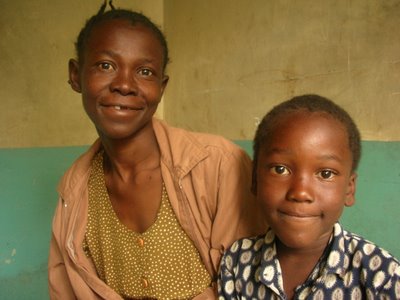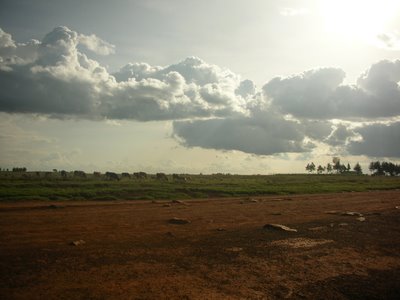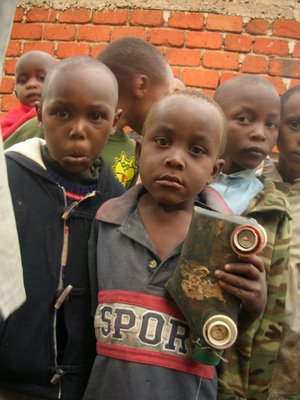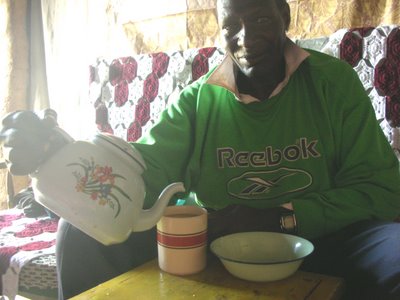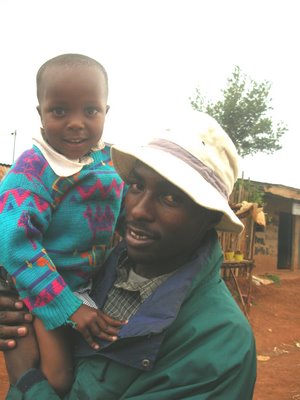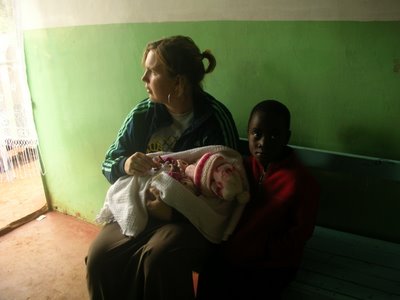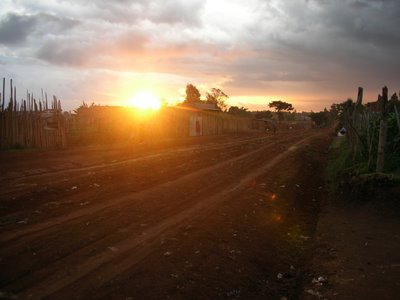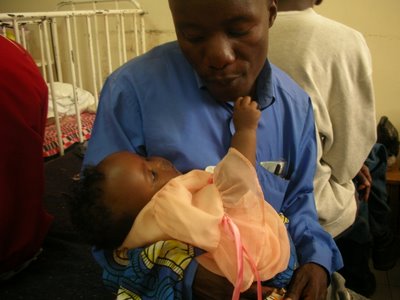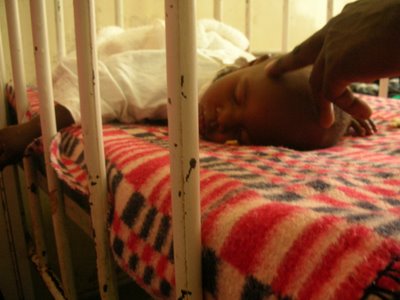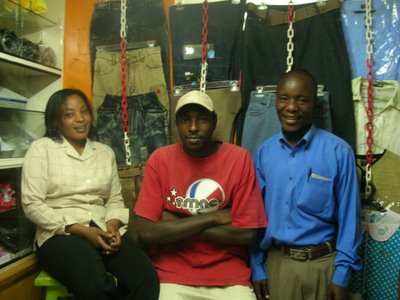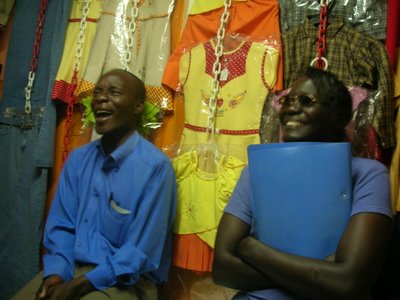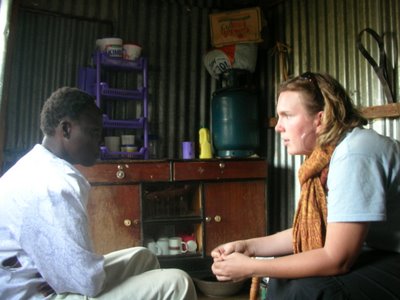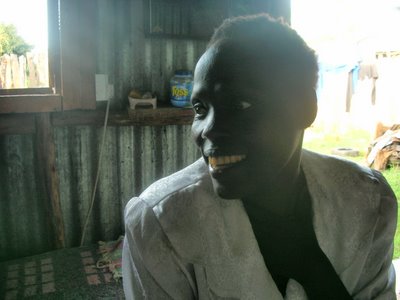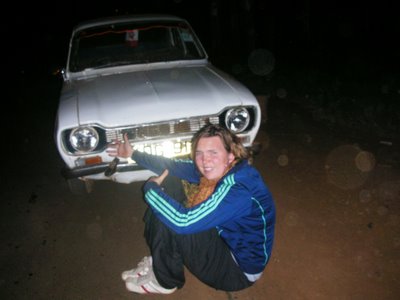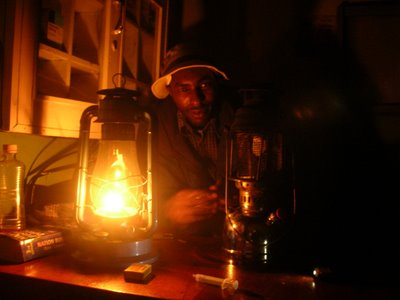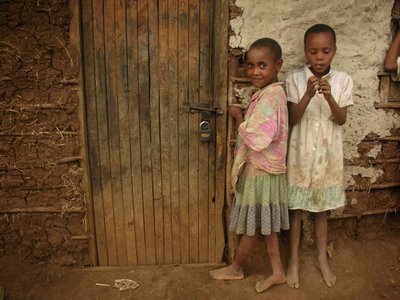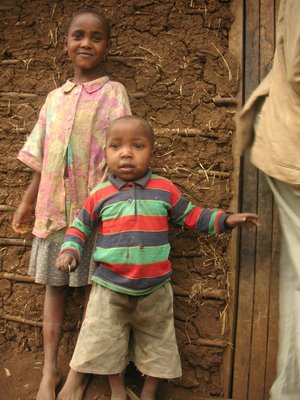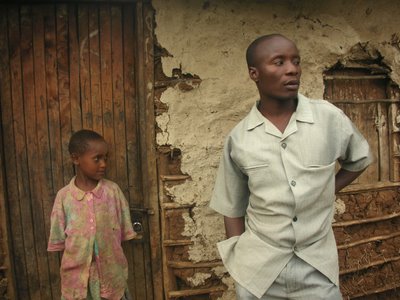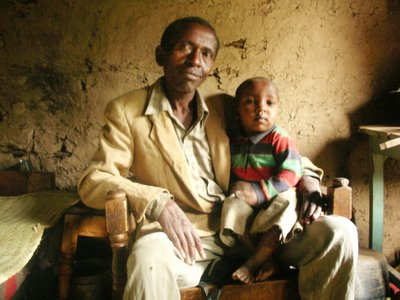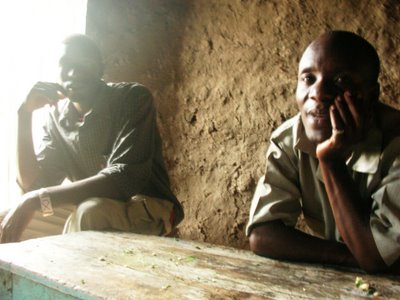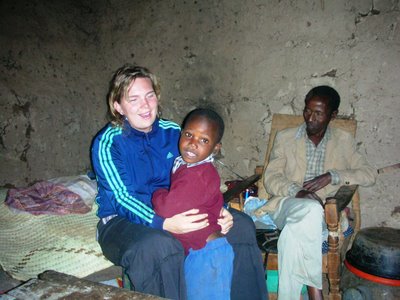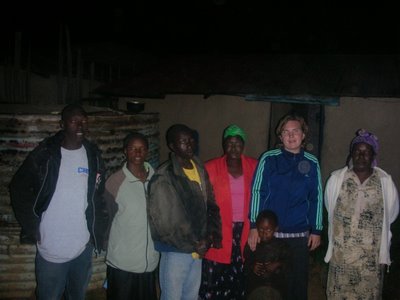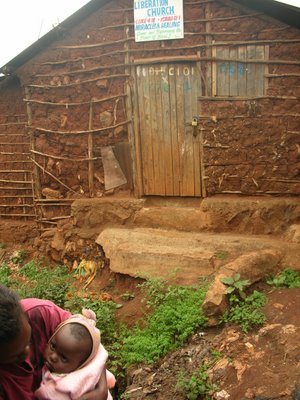 On June 10, I met up with Dr. Oronje and Nick to visit Tenderfeet Children Centre in the Kibera Slums of Nairobi. I had just arrived in Kenya a couple days earlier. The contrasts of Nairobi are so striking, every time I visit. There is so much disparity that it continues to blow me away...hopefully these photos say it better.
On June 10, I met up with Dr. Oronje and Nick to visit Tenderfeet Children Centre in the Kibera Slums of Nairobi. I had just arrived in Kenya a couple days earlier. The contrasts of Nairobi are so striking, every time I visit. There is so much disparity that it continues to blow me away...hopefully these photos say it better.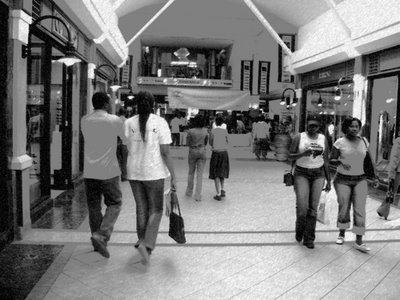







On Sunday morning, right before I met up with Dr Oronje and Nick, Amy McKee and I paid a visit to Nairobi Baptist Church. They have just built a super big church, I was so amazed at the size of it.
The pastor preached on Amos 8: talking about how righteousness is taking care of those around you who are oppressed and God’s coming judgment on the exploitation of the poor. “Hear this you that trample on the needy and bring to ruin the poor of the land…buying the poor for a silver and the needy for a pair of sandals, and selling the sweepings of wheat.” (Rapacious and fraudulent business practices that victimized the poor). The preacher went on to talk about the need for justice and social care in society and how Amos was speaking out about the abhorrent conduct of reducing the poor to sandals and slavery, deliberately taking advantage of them, a modern African example could be like selling charcoal with containers that were bent in reducing their volume and therefore cheating customers, especially the poor (on a micro-level). He said that true righteousness was how you treat others. I would totally agree and say true religion is how you treat others---and we will be judged not just for what we did, but what we did not do for others.
I thought this was a great, trembling passage, which speaks of the passion and anger of God over the neglect and exploitation of his human children, and convicts us all to look at our own hearts, our societies, policies to evaluate any streak of corruption, greed and exploitation of any of our brothers and sisters which is covered up unlawfully or even "lawfully and cruelfully" justified. This is the call of followers of the YaWeH to shine the light on dark unjust practices. But, the funny thing was (or really sad thing) was that the only example the preacher gave about living faithfully was paying ones “servant or househelp on time!?" Yes, that’s important in many societies but I was surprised that it was the only example/issue the preacher talked about in Kenya?! Maybe my mind was already drifting to thinking about Kibera Slums. I just thought that if one wanted to talk right into the heart of exploitation, then maybe one should mention the K-word.
After the service I said goodbye to Amy and then met up with Dr Oronje and Nick to visit Mama Margaret at the Tenderfeet Children Center in Kibera. I had been to Kibera once before in highschool when we had gone to pick up trash one day and do some cleanup in one of the areas. I remember gaining so much respect for Jesse Dortzbach that day, (8 years ago!--am I that old!) whose family had been involved in some of the ministries/development projects in Kibera. Jesse ran and walked around like he knew the place like the back of his hand.
When we arrived at the Center, after walking a little into an area of Kibera, we walked into Mama Margaret’s one room house and met Dan her husband and Pastor Nick Macharia, who had come to visit and have their weekly Sunday fellowship together. The told us the history of the center, and their vision and many of the challenges/issues they were facing in their ministries, separately and together.
Then Nick Macharia also preached a sermon and Dan led us in singing and worship. Macharia talked about people who were suffering from burnout because of Gods work, Those who were growing tired of "the calling" (he was referring to those serving in places like Kibera). He talked about how God had to revive the church, and the restoration of our souls so that people would be satisfied to serve the poor free of charge. It was a kind of liberation theology sermon....that when we reach the end of ourselves, God comes to revive us for noone can kill the call of God---"In the midst of ills, God, revive your work!" We will lose strength and that is why we depend on God to heal, revive, restore, refresh, renew...Because he lives we can face tommorrow and are more than conquerors, overcoming the world in Christ's spirit.
Both sermons i heard that morning brought up the verse in Psalms, "when my heart is overwhelmed please lead me to the rock that is higher than I." Both addressed issues of poverty and exploitation. One talking about the righteous treatment of others, and need for asking God what the reasons are when God hides his face----because of exploitative practices upon the poor; and what to do in the midst of that calling when we grow tired and weary. The latter came out of real involvement in exposing unjust practices and assisting those who are poor, and so often exploited for unjust gain.
Later I was stunned and troubled by some of the statistics they gave us about Kibera. One thing that I did not know was that 20 percent of the tax money/profit comes out of Kibera reveals the huge economic/people power of Kibera (1.5 million people live in Kibera; which is about 1/3 population of Nairobi). The conditions are horrible. It is government owned land—no one can buy the land but people own the structures on the land and make people pay rent---since it is government land all structures are taxed. One of the major issues is that they don’t rebuild good housing because there are so many landlords (structure-lords?) who don’t want to lose profit off taxing their impoverished structures—most of these structure-lords live outside Kibera and some are even ministers in the government---so basically the government is not doing anything, because---there is exploitive gain to be made in Kibera.
Tenderfeet Children’s Center and other schools have had difficulties with landlords/politicians raising the prices of the rooms/structures they want to rent/buildings and ultimately refusing to allow for new rebuilding of proper living structures because it could potentially mean “these powers” lose rent on the ownership of their taxable structures.
One thing they stressed is that any future partnership should work closely with them to evaluate the needs and the best steps forward. They both expressed the failure of many NGOs and CBO’s who had a vision for what to do in Kibera, but did not last because they were not working closely with the people, listen to them, or knew what the real needs were and how to make their methods/training/material resources sustainable in their management/maintenance and practice.
Kibera Revolution or Kibera Liberation: I told Nick he needs to do a film or write a song about a Kibera Revolution. With the number of people living there in those conditions, I could imagine people starting some major protest or rampage. Now it seems a sleeping or drugged population (kind of) in the sense of not revolting against the authorities. (I don’t really know). With the lack of schools, water, food, housing, toilet facilities, jobs…for 1.5 million people, who actually have that much economic power as a whole (many probably don’t realize it). If that population turned the tables and didn’t pay their taxes or boycotted alcohol or other businesses, what could happen? There is no government supported school or hospitals—all have arisen independently. The only thing the government has built is a huge women prison, which lies on the outskirts; there is also one power line connecting thousands of houses to electricity, which is actually quite dangerous/hazardous.
Alcohol: 25 percent of profits from the alcohol industry in Nairobi are consumed in Kibera; hundreds of trucks come every day—people said if all other alcohol businesses shut down-- trucks from the alcohol industry would still run into Kibera, because that’s where the business is. Drunkeness, poverty, apathy, numbness, ukimwi, impoverishment, death----yet it is not the total picture!
Obviously projects like the Tenderfeet Children center and the incredible people who work there are windows of brilliant love and light...there are also so many churches in Kibera! It seemed like there was a church on every corner. It would take more time spent there to understand what they are like, but the small service we had together with Dan and Margaret and Nick (as well as Nick and Dr D) was meaningful and powerful.
Nick Macharia also told us about his ministry. He had heard of Kibera through visiting inmates in prisons. A large proportion of people in Kibera have seen the inside walls of prisons. He talked about how many churches stigmatize prisoners; they receive little support from churches. His prisoner ministry (the guy has met and been in contact with Chuck Colson) had to be started it independently. Kenya’s prisons are rated some of the worst in the world, and there is no rehabilitation projects, most people who come out of prison later return---for their conditions or opportunities have not changed.
75 percent of people in Kibera have been to prison. An alarming and very disturbing statistic is that 65 percent of people who are charged with murder and have to wait two years in prison before a conviction, are found not-guilty! So that means that many people are detained in prison, before evidence or a court date for two years and 65 percent are not charged! The waiting process is extremely long separating families and making them more impoverished.
Macharia’s Prison Ministries has started to be spokespeople/advocates for these detaines and comfort assist separated loved ones. They have started to do some advocacy, with other lawyers who will speak for the rights of prisoners who are detained for long periods of time without a trial, evidence, etc. in degrading conditions. He is working on doing more advocacy, and has designated a number of pastors around the country to do work in the prisons located around them. If more advocacy is not done, the conditions of these prisons and the legal system will remain the same, and anything else you are doing will only put a little band-aid on a huge structural problem.
The following week I was reading and listening to the news about the Soweto Uprising (June 16, 1976). Soweto is the largest slum in Africa followed by Kibera. I was already thinking about what would happen if there was an uprising/revolution in Kibera one day, and there were so many similarities in that historical events circumstances and even Soweto’s modern day struggles.
http://news.bbc.co.uk/2/hi/africa/5080672.stm
http://news.bbc.co.uk/2/hi/in_depth/5078654.stm
The Soweto protests/uprising were about the use of Afikaans in the town schools, which to many was considered a “language of the oppressor,” as well as the drastically unequal conditions and poverty ---which still has not been abolished or alleviated-- for Blacks in South Africa living in Soweto under the system of apartheid.
So on June, 16, 1976- the youth of Soweto grew frustrated at their parents for not speaking about the inequalities, and so the youth decided to take it up for themselves. Children and youth gathered to protest and sing about their distaste for using the oppressor language and in so doing, police executed violent and lethal actions against this force and many were killed. The Demonstration became a national crisis, and many youngsters paid a price---hundreds were killed and lost reputation. The incident was later marked a crucial turning point in the rebel movement/fight against apartheid. The pivotal movement was started by the protests of children.
Today, some say there is now a loss of pride in Soweto. Some of the Soweto projects are good and some are bad---not quite like it was during apartheid, but varied good to bad. Some have said that one of the biggest struggles is the “normality of poverty”, and the normality of the situation (perhaps this is similar to Kibera’s spirit). This can be a big danger because it seems to negate any movement/will for change; the opposite reaction or perhaps coinciding condition is the danger of people revolting in their distress of poverty in their unjust system in a negative way. Efforts to stand against the system and act for change is necessary and should be done and supported, but hopefully not in a way that leads to violence and death.
Today in Soweto Primary school have different relationship with police; more people accept police brutality, and are accustomed to it. Today-education is still not equal. There are more opportunities these days, but the struggle with education deficiencies such as no free primary education will damage the economy even in the long run as there will be a shortage of skills industry and business of the youth are not receiving a good education.
So like Kenya, although primary education is supposed to be free, there are no public schools in Kibera, and the Kenyan government refuses to build them there (remember that part of that ineptness is because the government leaders depend on taxing those on rent and don’t want to rebuild better structures if it means they may lose their money). Mama Margaret provides most things: porridge, free schooling, but they still need many educational supplies.
So the same things are needed in the slums of Soweto and Kibera including democracy- right to equality. Poverty dehumanizes people, and is utterly unacceptable and disgraceful. I kind of wonder what the process has been for the people of Kibera. Have their been huge protests that have happened and I neglected to read or hear about? Have there not been any? If so why not? There hasn’t been a huge riot/strike that I know of that happened in Kibera. (But i don't read the news all the time to keep up with everything).
The Soweto Uprising—30 years ago—shook South Africa Those riots were about apartheid—and were not initiated by the ANC but the young people of Soweto. And so I sometimes wonder, what is the likelihood of something like that happening again? But the issues would be the war on poverty and unemployment, lack of resources to tackle HIV/AIDS, and distress over alcohol abuse? The huge challenge that remains today is destitute poverty. Can people change and attempt to upraise those who have been so depraved, those who have been exploited by the powers? One person said that the people of Soweto were still like the people coming out of Egypt (40 years in the wilderness), people are still in the wilderness, no one has reached the promised land. Still 80 percent of blacks in South Africa are poor, while 20 percent of whites struggle financially. It seems there are some stark comparisons to Kibera. The poor are being exploited by the powers, structures, government, those who are “less poor”. And the biggest challenges remain: Poverty, Unemployment, Alcohol and Drug Abuse, and HIV/AIDS.
PHOTO GALLERYHere are some more large shots of Kibera. The first photo with the flag and cross is another church that meets together without a building.


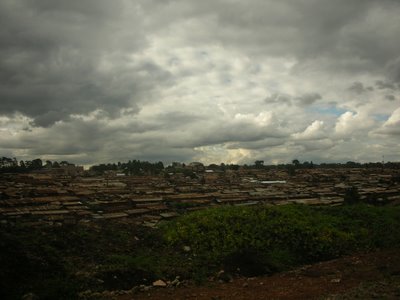
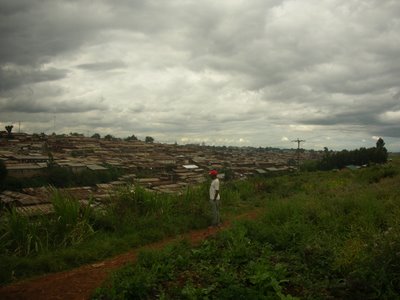
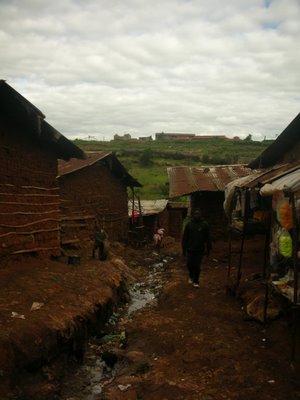
Pastor Nick Macharia is explaining more about the systems in Kibera, and some issues in the prisons he visits all over Kenya.


The warm-hearted and compassionate leader/teacher, Mama Margaret. She is the head of Tenderfeet Children Centre. She moved to Kibera and became a teacher many years ago. And then she later decided to start her own school to help orphaned and vulnerable children. Her husband Dan stand in the back beside Nick from Eldoret.
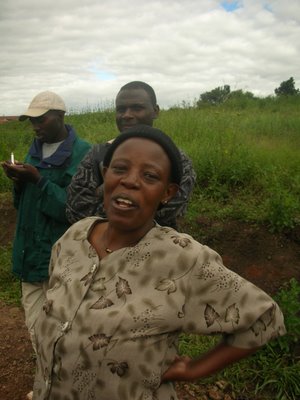
A few young girls sit alongside the road in Kibera Slums.

I call this photo, "Monet's Kibera-Bay of pigs."

Dr Oronje writes a prescription for a young girl who was staying with Mama Margaret and was very sick. Another teacher from Tenderfeet pays a visit and Macharia watches Dr D in action.
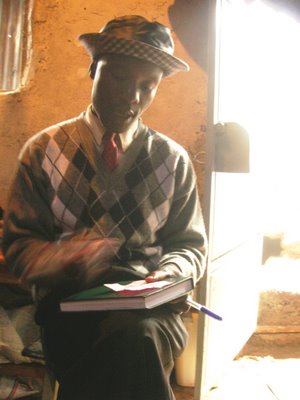

Father Dan and his beautiful youngest child sit together during our mini-church service.
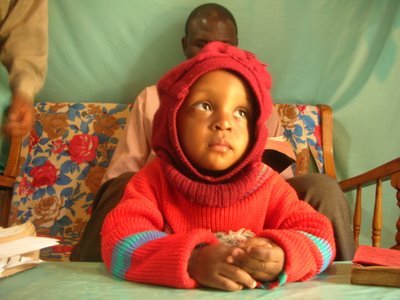

Pastor Nick Macharia delivers an impassioned sermon.

As we were touring different parts of Kibera, we bumped into a mother and her child. Both were on their way to find a doctor because the 8 month old child was very sick. After Dr Oronje talked more with the mother on the child's condition, we walked to a little clinic and Kibera to talk to a doctor. Dr Oronje wanted to confirm and make sure that this mother and child would be assisted adequately, would receive the correct perscription and get what she needed. After he had counseled the mother more, she told him that both she and her child were HIV positive, and therefore it was imperative that the child get good medical attention quickly to maintain her immune system. Once they waited at the clinic, she was given malaria medicine for the child.



One of Kibera's food markets. With one of my growing favorite items Daga (little fish). This year in Tanzania I have grown quite accustomed to it. Wouldn't say I crave it fortnightly, but if its prepared well, its not bad!


Nick is practicing his digital skills to perfection. A school is shown in the background.

Mama Margaret showed me where they are getting water for the children, a small tap of city water beside the church in which they are currently using for hosting the school kids due to renovation. Otherwise the water is absolutely polluted in Kibera. All streams are absolutely filthy and are covered with "flying toilets", plastic bags full of human faeces and waste.
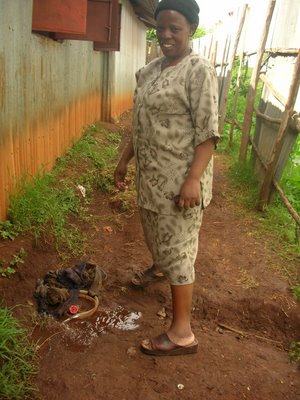

An un-sober fellow begged me to take his picture of him as we walked in Kibera. He was overjoyed at the result. Alcohol Abuse and Consumption is a huge problem in Kibera.

